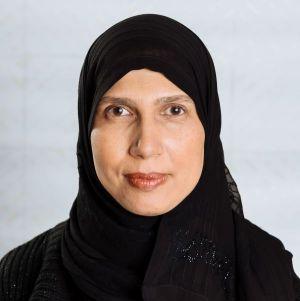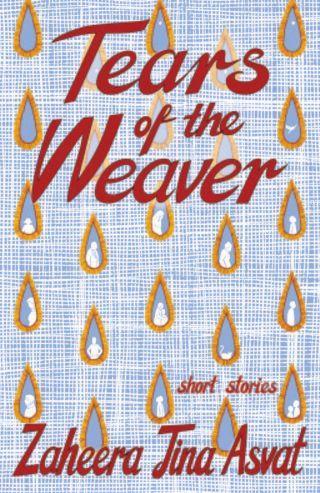Alumni spotlight: Dr Zaheera Jina Asvat
- Wits Alumni Relations
The 2025 Nadine Gordimer Short Story Award winner shares how she juggles her dual passions of writing and teaching.
Wits alumna and lecturer in maths education at Wits, Dr Zaheera Jina Asvat (PhD 2014), has been announced as the winner at the 2025 South African Literature Awards.
At a ceremony held on 11 November 2025, her collection of 10 stories in The Tears of the Weaver (Modjaji Book 2023) received the 2025 Nadine Gordimer Short Story award. This book previously was a finalist at the 9th Humanities and Social Science Awards in 2024.
The publisher has said the stories in the collection “provide a rethinking of conventions and roles, enabling readers to challenge the social phenomena within the world that religion and culture govern. These stories are earthy, feeling portraits of people struggling against an oppressive system within post-apartheid South Africa.”
It has been praised by reviewers as “a beautiful and necessary book. It speaks into a silence around lives, particularly women’s lives, in Lenasia, but also breathes a magical humanness into the characters in the clever, gentle, real stories in the collection. There is an element of magic in the book: in the everyday strangeness, in moments of transcendence and moments of darkness too.”
Wits Alumni Relations reached out to Dr Jina Asvat, who answered a few questions related to this award.
What does this acknowledgement mean to you?
“Winning the Nadine Gordimer Short Story Award is both affirming and unexpected. The truth is that since joining Wits in 2020, I haven’t had the luxury of writing creatively with intention. My focus has been on academic publishing, research output, and the demands of teaching. Creative writing often had to take a back seat, and I only wrote short stories when I was invited to contribute to collections.
“So, this award feels like a gentle reminder from the universe, that even when I don’t have the space to nurture my creative voice in a sustained way, something within me still insists on being heard. It reassures me that the stories I tell, rooted in community, identity, vulnerability and social tensions, still have resonance.
“Receiving an award named after Nadine Gordimer also carries a deeper meaning. Her work illuminated uncomfortable truths about South African life, and in a small way I hope that my collection does something similar: opening windows into characters who are often unseen, exploring their hidden fears, their quiet struggles, their lived contradictions. This recognition encourages me to return to creative writing with more intention — not instead of my academic work, but alongside it — because both forms of writing ask me to pay close attention to the world.”
Was there one story that stands out more than the others?
“It’s difficult to choose, because each story demanded something different from me emotionally. But my readers often tell me that “A Play of Power” stands out for them. It follows Bhajee, an estate owner in Lenasia, who cannot comprehend why City Power has cut off his electricity. The story is humorous on the surface, but underneath it probes entitlement, social disconnect, and the strange dance between privilege and helplessness.
“A personal favourite of mine, however, is “Bewitched”, the opening story of the collection. It tells the tale of a young girl whose mother is desperately trying to find her a husband, but whispers circulate that she is bewitched. I enjoyed writing it because it sits right at the intersection of superstition, community gossip, and a young woman’s yearning for agency, a mixture that is so characteristic of many South African-Indian spaces.
“The story that felt the most important to write was the one about Suhail Mangal. He is a young man from India who comes to Johannesburg in search of work but finds none because of xenophobia. His feelings of helplessness and growing dependence on his wife expose a different kind of vulnerability, one that is rarely given narrative space. It was emotionally demanding to write, because it required entering the quiet humiliation and frustration that so many migrant men experience but cannot articulate. These stories are not happy tales. Instead, I tried to enter each character’s most hidden insecurities; the things they fear, the things they avoid saying, the silent burdens they carry.”
How do you juggle the dual passion of teaching and finding time to write?
“At this stage of my career, I juggle it imperfectly – and I’ve made peace with that. Academic life is demanding, and research output often has tight deadlines and external pressure. Creative writing, on the other hand, needs emotional spaciousness, which I can’t always access while navigating the realities of academia. So, I don’t write creatively every day or even every month. I write when invitations come, when a story grips me unexpectedly, or when the characters become insistent enough that I must sit down and listen. Teaching and research do nurture my creativity in unexpected ways, though. Working with students keeps me grounded in human experience, in curiosity, in the complexity of learning and identity. Research keeps me disciplined and attentive to detail. And somewhere in all that, when the right moment arrives, the stories surface. I’m learning that creative writing doesn’t disappear just because I cannot attend to it full-time – it waits. And this award reminds me that I owe it some attention again.
Other alumni winners and runners up at the 20th edition of the SALA awards include: Lebogang Seale (MA 2021) who received the First-Time Published Author Award for One Hundred Years of Dispossession: My family’s quest to reclaim our land (Jacana 2024) and David Mann (MA 2022) was the runner-up in the same category as Dr Jina Asvat for Once Removed: short stories (Botsotso 2024).


